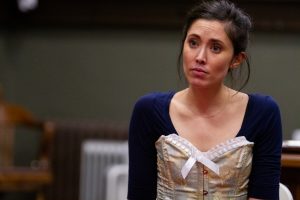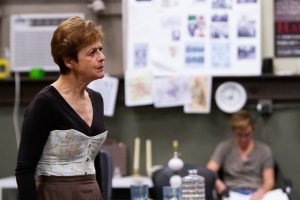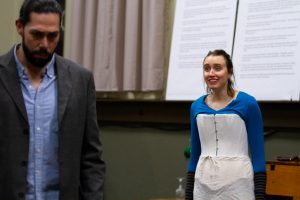During rehearsals for Rutherford and Son, director Mechelle Moe (MM) and cast members Jeannie Affelder (JA), Christina Gorman (CG), and Rochelle Therrien (RT) chatted about the play and their responses to it.
(MM) Hi everybody! Happy Wednesday afternoon! I’d like for everyone just to say who’s at the table. I’m Mechelle Moe, and I am directing Rutherford and Son.
(CG) I’m Christina Gorman and I play Janet.
(RT) I’m Rochelle Therrien and I play Mary.
(JA) I’m Jeannie Affelder and I play two roles: Aunt Ann and Mrs. Henderson.
(MM) : And these are the ladies of Rutherford and Son! We are exactly one week into the process. It’s been a really wonderful, fantastic, and hard week. And we’re learning as we go. I just wanted to start off the conversation talking about some information we started with in rehearsals last week with table work. We always start off with dramaturgy and laying the land of the environment of the play, and I just wanted to start first with why TimeLine selected this piece in particular and how we thought it was a really wonderful play to put into the season and why I’m so excited.
Githa Sowerby—our playwright—has been kind of erased from theatrical history. This was a play that debuted in 1912 in England during the time of the Great Unrest. And it was quite a hit at the time, produced by the Royal Court Theatre as part of its New Play Series. It was only scheduled to run for four shows, four matinees, and ended up running for 133 performances with an extension in New York City. Something I learned that was very fascinating to me is that the play itself was advertised by Sowerby’s initials, K.G. Sowerby—and that actually wasn’t her choice.
(ALL) Ohhhhh …!
(CG) I assumed it was a pen name and that she was just trying to avoid the discrimination …
(MM) That’s what I thought as well—she was just trying to mindfully advance her work by making that choice. But in fact it was the Royal Court Theatre that made that choice—
(JA) —a man that made that choice.
(MM) Yeah! That’s very much it. But that decision actually may have saved the play. Because had it gone on as her full name, it a) may not have been produced at all, and b) certainly wouldn’t have been met with the praise the critics bestowed upon the play itself.
The fact that they didn’t use her name was a point of contention for her. So, when it was discovered that it was a female playwright, it was the talk of the town. Scandalous—how could a woman possibly write about the themes of this play!—the intimate knowledge she had in order to write the scope and depth of this piece. And I didn’t know if you had any initial responses or reactions, kind of learning more about her life and how much of it she really drew from to create this world.
(CG) Yeah! So when I got the initial audition, I was really rushed and I didn’t clock the playwright at all, I didn’t even see the name, and when you pull up the PDF it said the initials K.G.S. So I, of course, assumed it was a male playwright. Why? A) experience and B) because it was written in a time period where unfortunately, it was very rare for women to be produced. But I read it and was completely sucked into the world of the play, and it wasn’t until I got to the last scene that I thought “Who was this playwright?” I know there were a bunch of awesome male playwrights who championed women’s rights but still I thought “Whoa, whoa, this is really interesting, who could have … OH it’s a woman!” It just made sense to me. I was pleasantly surprised and thought it was kind of revolutionary that she was writing at this time period.
(MM) Yes. It’s a huge criticism of capitalism and industry at the time, really examining gender roles, the strikes, and everything that was happening with all these industries and unions rising up. And at a time when it wasn’t fashionable to be educated. Even Githa herself didn’t receive an education. She was pretty much self-taught when she moved to London. But everything else on stage at the time was from a male perspective and often female writers were really pushed out and discriminated against and not lifted up.

(RT) And I think I remember in our table work, Maren, our dramaturg, had mentioned that it was one of the actors who later went on to play Mary that championed her and pushed her to keep writing this story and how important it was to keep going. But, I started reading Looking for Githa which was written by Patricia Riley. You can speak more to who Patricia is.
(MM) Patricia Riley wrote a biography on Githa when the play was rediscovered in the 80s by a very tiny feminist theatre company. It hit the scene again in the UK and the National Theatre produced it, but then it kinda died down again. At the time though, no information was out there. Githa lived until 1970. She died at the age of 94 in obscurity. And she was so upset about the fact that she didn’t believe the public nor her family cared about her work or career, that she took all of her letters and photographs, and burned them before she died. So really there wasn’t a lot of information or documentation on her. Patricia Riley really, on her own accord, took it on herself to write this biography and got in touch with Githa’s daughter, who was elderly at the time. And Githa and her mother didn’t have a great relationship which speaks to a key element of the play that you’ll notice … once you see it multiple times.
[Laughter]
The mother is absent much of the play, only referred to in a few lines and at first a lot of us thought there was this master “What happened to mom” question like “Did Rutherford kill her”? “did she die in childbirth or tuberculosis?” And after I looked into the research I realized, “Oh, she didn’t write a mother in because she herself didn’t really have a mother.” She didn’t have a relationship with her own mother. And while we will come up with our own reasoning about what happened to mom, it makes a lot of sense that Githa didn’t write a mom because of her own personal relationship.
But back to Patricia Riley, she worked with the daughter to unearth some information and contacted relatives in Canada that had photos and stuff and compiled this really beautiful portrait of Githa, who was a brave, bold, feminist of her time. And writing and speaking to things that other women weren’t or didn’t have the platform or opportunity to do. And not only with this play but she continued to explore these major themes and ideas throughout the rest of her writing career. But speaking of how she modeled the characters after her family, do you guys have thoughts on that?
(JA) I think good playwrights have to get inside every character in the play and work through every character’s point of view, and I think Githa is a really good playwright. She represents Rutherford and his desire to keep the business going, his loyalty to his ancestors, his desire to have his business continue with his children. She also writes sympathetically about the members of the family who don’t care about the business, who want to throw it to the river. She writes the perspective of the people in the house looking into the town and the people in the town looking into the house, and she makes everybody a hero in their own life. Everybody stands on their own two feet, and I think that’s admirable.
(RT) Githa’s story is really interesting and her family story is fascinating. You can see how she draws from so much of her own life and her own family history. It’s so rich with drama and heartbreak and, from what I’ve read of the biography, not a lot of joy. But it is a wonderful look into the idea of taking charge of one’s own life. That was not done a lot back then, yet we see that a lot with the characters in the play and in Githa’s life.
(MM) She wrote this play when she was 35. She was born in Gatehead. Her family, the Sowerbys, were a glass-making family. Sowerby Glass, in fact, still survives today and you can still buy pieces. We also have some on display in our lobby as well as onstage.
She very much modeled Rutherford off her grandfather and great-grandfather, and it was her father who mirrors the younger son in our play. Githa’s father really rejected the glass-making industry, wanted nothing to do with the factory—he wanted to be an artist. He eventually left the company and sold most of his shares to support himself as an artist, which really didn’t go into supporting his own family. He moved his family to London and that’s where Githa had an opportunity to meet other artists and educate herself through lectures and theatre, to be self-taught. When her father passed away, he secretly had sold off the final shares of his company and basically left his wife completely penniless. Githa ended up taking care of their family herself, not only supporting her mother—who she didn’t have a good relationship with—but also her sisters, including her younger sister who she wrote several children’s stories with. So she had already published 11 children stories/books before she wrote Rutherford and Son at the age of 35. But while her father was still a part of the glassworks company, she was often brought into bits of the business and he often relied on her to host his meetings at the house which she really detested. She was always forced into roles by her father that she didn’t desire herself.
(CG) I love that in the dramaturgy packet we got on the first day of rehearsal, there was a story that she wrote one of her last plays as an apology to her daughter. It’s about this mom that is really socially restricting her daughter and it’s really—I found that really heartbreaking. She probably couldn’t express it through her words, she did it through her art.
(MM) It is so interesting because a huge theme, if not the baseline of our play, is legacy. And whether people want to embrace their legacy or deny their legacy and strike out on their own. As we’ve explored the play the past week, do you have any thoughts on that?
(CG) Well I love the idea of legacy—business and personal legacy, and how we interact with our family members. It’s such a complex issue to dive into because it is so multi-layered.

(MM) And without giving away the ending of our play Rochelle, would you like to speak to the impact of legacy in your character’s world?
(RT) Oh boy, no spoilers.
(MM) Yes, you have to come see the play!
(RT) Right, if you want to find out what happens, what Mary does.
(MM) Dun dun dunnnnnn.
[Laughter]
(RT) Legacy as it pertains to Mary is interesting and I think it does evolve and reveal itself through the course of the play since she is one of the characters who isn’t related directly to the Rutherford’s—
(MM) Boy she wishes she hadn’t married into that family. [Laughs]
(RT) Yeah, she doesn’t realize what she’s getting herself into until a little bit too late! And Mary is—
(CG) She is such a wonderful outside perspective, almost the audience’s way into the family. So that last scene at the end is so interesting, which we can’t talk about, but yeah, I love that about her.
(MM) But the potential of creating your own legacy, right, putting the definition and ownership to a legacy.
(RT) Right. I think there’s also something in the why behind a legacy. What is driving each character’s desire for a legacy, or their desire to rid themselves of it? But I think Mary does take a stance, a strong stance, for the legacy she wants to create and leave behind.
(JA) And Rochelle, your character is so opposite from my character, Aunt Ann who’s very much a member of the old guard, a “things were great before and if we could only make that again everything would be fine” kind of—
(CG) Not at all relevant.
[Laughter]
(JA) Which is one of the reasons TimeLine chose this play,
(CG) Yeah! There’s so many issues that pop off the page. You could go to this play regardless of your background and find something you’re intrigued by because there’s so many things that are relevant to 2019 that are explored in this play. Which is no small feat for sure.
(JA) Right. So my job is to hang onto the past. In my mind, it would be grand to see Rutherford’s like old times again. And that’s Aunt Ann in a nutshell.
(RT) And Mary says, “This is how you’ve known it all along. You can’t see it as I do,” as this outside perspective, to see this overbearing quality of life that the Rutherfords have created.
(MM) From this past week, we have now moved from table work to getting up on our feet. We’re two-thirds of the way blocked so far and this is our initial kind of attack on the play. Of this past week, what has been most surprising or exciting or, any discoveries that you’ve made?

(JA) My story of the week is that over the weekend, we put on rehearsal skirts for the first time. So the three of us were wearing skirts to the floor, practicing walking in different kinds of shoes that were more to 1910, and I think it was Eva, our Associate Director, who presented this information at the end of rehearsal, “Women, you can’t stride. You can’t take long steps. Because in this time period you wore lots of petticoats, your skirts were heavy to hide your legs. And to show the shape of your leg, either by taking a long step, grabbing your skirt, or showing your ankles, was considered rude and risqué and was not done.” So I left rehearsal and I went home. I live near a high school and this weekend was the Homecoming dance. And I watched packs of kids coming and going to the dance and young women in high school in 2019 coming out of the dance, they were all dressed exactly the same; they were all wearing extremely short dresses with bare legs and high heels, despite the cold weather, and sleeveless tops, and very revealing cleavage. And the contrast between a hundred years ago was so striking. And I just thought “Well, the clothes tell such a story about culture and—
(RT) —about expectations for women. Whether it’s 2019 or 1910.
(MM) Again someone taking a walk with a man that’s not their husband, in this play, is prostitution.
(CG) That doesn’t really hit on you. You know it’s like I thought I had done that but, yeah to even be alone in a room with a man that wasn’t related to you was incredibly dangerous.
(JA) And as actors in 2019, we’re pretty touchy-feely. We touch each other, we greet each other, we share sweaters. We’re very open with our bodies because that’s our instrument when we walk into the rehearsal room. And to contrast that with the men and women in the Rutherford house is …
(CG) It’s a stark difference.
(JA) Right, it’s a stark difference. And part of our job as actors, directors, dramaturgs, and costume designers, is to use all our tools to tell that story.
(MM) We talked a lot about the stakes, and how they’re different, and how it’s really important—I ask audience members—what’s important to realize is how really badass Githa is at telling this story. Because these are things that weren’t talked about. And the stakes of it as women being labeled prostitutes for taking walks with men or being alone with them, but also there are a lot of financials that we’ve been talking about this week. Can one of you speak to the financials, because we’ve worked with our dramaturgs and … there are a lot of numbers that are released in the play that, if you’re not paying attention or placing what these numbers from 1910-12 mean in 2019. Can one of you speak to kind of those discoveries and what we’re trying to get audiences to shift their lens so they understand the depths and the stakes at play in this production?
(JA) So Mrs. Henderson’s son gets caught stealing 10 pounds from the cashbox. You’re thinking—
(CG) “Hey, it’s just ten pounds!”
(MM) It’s just ten pounds, it’s not a big deal! But then you learn that 10 pounds was …
(JA) … almost 1,000 dollars.
(MM) Which then, the crime becomes much more severe, right?
(RT) Stealing a thousand dollars from your boss is A LOT.
(MM) Even Rutherford sending his son, John, to Harrow’s for private education for one year you’re thinking “What a cheapskate! Only one year at a boarding school? That’s nothing.” But the reason he sent him for one year was because it was—
(CG) It’s like 200,000 pounds, right?
(MM) It was about 4,000 pounds for today, and that—that’s a lot of money. And the money that Rutherford’s company loses is something like 400,000 pounds back then, and that’s an epic amount of money today, not to mention how much it was back in their time. So this is all about re-framing the lens that you’re looking through when watching this play and tuning your ear to those details and facts because the stakes are, as I’ve said to everyone— it’s not a play where we’re waiting for a fuse to get lit. This fuse is a third burnt and going fast, right? The action of this play and the stakes of this play are extremely … extreme.

(RT) I think in the same vein something I’ve mulled over in the first week of work that we’ve had is the idea of duty in this time period. It’s not something that I think we can really wrap our heads around as living in 2019, this sense of duty to your family, to the family legacy that’s been created for you, to your loved opens, to your spouse, to your children, it’s another pair of glasses, another way for the audience to look through our play. The stakes were just so much more extreme. When you get to see the Rutherford adult children trying to take charge of their own lives—that’s a huge deal, a huge revolt against what was expected of them at that time.
(MM) And while this is a very compelling family drama, I think another discovery we’ve made is that there’s, as with anything well-written, there’s a lot of love, a lot of humor, and we’ve found opportunities to embrace those and lift those up. But there’s a little something for everyone, I feel.
(JA) We all come from a family and we all know about relationships in our own family so watching someone else struggle with their father and with their siblings is compelling, a little voyeuristic, and there are moments where you can go “That’s not my family, that’s not my problem” but it’s still real life.
(MM) Any other thoughts before we close this round table? What’s something that you’re most excited for the audience to see?
(RT) I hope the takeaway is, as we discussed, “Oh my gosh. This is really … revolutionary.”
(CG) Yeah, as Rochelle already said, and spoke to earlier, there’s so much going on in this play. So, I guess I’m just excited for the audience to be immersed in the world of this play. It’s a unique journey we’re taking the audience on. And most Americans don’t really know about this time period in this specific region of the UK, but so many of the themes are universal, so just come on in and enjoy and get sucked into the world we’re creating because I think it’s really unique and fascinating.
This is an edit of this entire conversation with the women of Rutherford and Son. To listen to an audio podcast of their conversation, click here.

